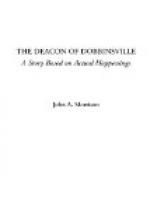On that evening when he faced for the first time his brush-arbor audience, it was plainly to be seen that he did not lack for something to say. He did not let his sermon get in the way of his message. He went right to the heart of his subject, which he announced as Salvation. He took for his text Titus 2:11, 12: “For the grace of God that bringeth salvation hath appeared to all men, teaching us that, denying ungodliness and worldly lusts, we should live soberly, righteously, and godly in this present world.”
His sermon ran partly thus: “My friends and brethren, we are here this evening to conduct this service in the fear of God. Almost a year ago I received a letter from Brother Benton urging me to come to his place to hold a revival. Owing to my many calls, I was unable to come until the present time, and now at last we are here in the name of God. We expect him to give us a gracious out-pouring of his Holy Spirit. The text that I have read in your hearing introduces my subject, the subject of Salvation. I feel the burden of this message pressing upon my heart. Since Jesus saved me from a life of sin I have had a consuming desire to get others to press their way into this grand experience. I shall not promise to keep within the bounds of homiletical order tonight, but I do promise to keep within the bounds of God’s Holy Word and the leadings of his Spirit.” These introductory remarks were stated with a simple earnestness born of a desire to see men saved.
The Evangelist first proceeded to show what salvation is. He said it is a divine work of grace in the heart, wrought by the blood of Jesus Christ. He explained that it means deliverance from sin. He said that if the Bible teaches anything at all, it teaches that the individual must have a vital connection with Jesus Christ.
Next the Evangelist set forth the conditions of salvation. “First,” he said, “a man must be sorry for his sins; secondly, he must repent of his sins; and, thirdly, he must forsake his sins.”
He dwelt at great length on the effects of salvation in the heart. He said that if a man’s religion did not have any effect on him, it was worthless. A man’s religion must make him a new creature, he argued. He declared that salvation makes a man love even his enemies. He said salvation cleanses a man from inward and outward filth.
By the time Evangelist Blank had illustrated and amplified all his points he had consumed the major portion of an hour and a half of time. During this time the entire audience was held spellbound by his simple and earnest eloquence.
All this was strange theology to the members of Mount Olivet Church. It was a stinging rebuke to their crooked and hypocritical lives.




